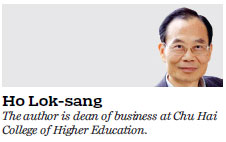Efficient use of housing stock is urgently needed
Updated: 2018-05-02 07:28
By Ho Lok-sang(HK Edition)
|
|||||||
As price indicators hit fresh highs, Ho Lok-sang urges overhaul on rules for HOS units to ensure those who need homes have them
Last week, a key indicator of Hong Kong's housing prices hit new high again. The Centa-City Leading Index CCL rose to 180, arousing increasing concern over the relentless surge of Hong Kong's housing prices. It is apparent that the ongoing effort to seek more land for housing development is unlikely to stem the further rise of housing prices, as panic purchase takes over potential buyers.
News like this has been recurring over and over again in the past year. It has ignited wild suggestions of all kinds. A caller to an RTHK phone-in program asked: Why not just mandate that housing prices must not rise beyond the current level? Others suggest rent control; still others suggest selling HOS and public housing at replacement cost.
The problem is: None of these proposals will work.
If supply lags behind demand, fixing an artificially low price will require selecting who will be allotted the precious right to purchase at the low price. The low price will attract even more buyers who want to test their luck. It will certainly boil down to a lottery, and will certainly fail to help the most needy.

The government has rejected rent control for a good reason. Artificially depressed rents will lead to inefficient use of the existing resources and will suppress supply of rentable apartments. Lucky ones will certainly enjoy the benefit of lower housing cost, at the expense of the unlucky ones who will have a harder time finding a place to stay. Rent control will certainly aggravate the homeless problem, as some tenants will lose the incentive to share the apartment and the cost. There will be not only queues for public housing, but also long queues for a private apartment.
I applaud the government's effort in seeking more developable land, and want to register my plea for the public to support these efforts. As Stanley Wong Yuen-fai, the chairman of the Task Force on Land Supply, observed, each of the options on his list will be painful because there is a cost to every choice we make in a world of scarcity. It is just basic economics that land has alternative uses. If we use a plot for housing, it will no longer be available for other purposes. We need to make up our minds about our priorities, always thinking about what constitutes the best social good.
However, I would argue that there is actually still room to improve the efficiency of the usage of our existing housing stock. The special administrative region government is moving in this direction in proposing that Home Ownership Scheme housing can be made available for rental at lower-than-market rent without repayment of the owed land premium. This makes sense. We can consider the HOS apartment as co-owned with the government because the land premium has not been repaid in full. We can imagine the apartment to be rented at market rent but the government as co-owner is entitled to part of that market rent. This rent, instead of being collected by the government, is just repaid to the tenant who meets the criteria for subsidized housing. In this way, people in the queue for public housing can have access to subsidized housing through renting HOS apartments. This arrangement should be allowed for all existing HOS apartments that have been sold.
I would further propose that the terms of sale for all new HOS housing that has not yet been sold be revised, to the effect that buyers must firstly actually live in the apartment; secondly not own any property in Hong Kong or anywhere; thirdly on resale sell the apartment only to households who meet the criteria for buying an HOS apartment and not in the open market. Instead of restricting the time of resale to 10 years after moving into the apartment, the buyer can resell the unit at any time, as long as resale is to those who are qualified to buy an HOS apartment. I would propose that buyers under the Green Form Subsidized Home Ownership Scheme should be subject to these restrictions too. An HOS apartment owner can sell his apartment and buy another HOS apartment if this intention is registered with the Housing Authority. If this intention is not registered with the HA, then application for an HOS apartment must be conditional on meeting the stated criteria for application.
The proposed arrangement will enhance the efficiency of the use of the new HOS housing stock. First, those buyers who are actually financially capable of buying in the private market but are looking for a "good investment" because the purchase price is below market will likely opt out, because the HOS purchase will make investing in the housing market impossible. Second, because resale is allowed without a time restriction, owners will not "sit on their units" until the term of the embargo is over. "Sitting on their units" may be highly inefficient, especially if they do not want to take the risk of renting them out, given that some tenants may not be very good at keeping the apartments tidy and in shape. Third, any apartment resold then translates to a qualified household buying an apartment.
(HK Edition 05/02/2018 page8)